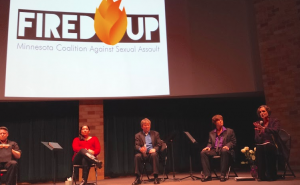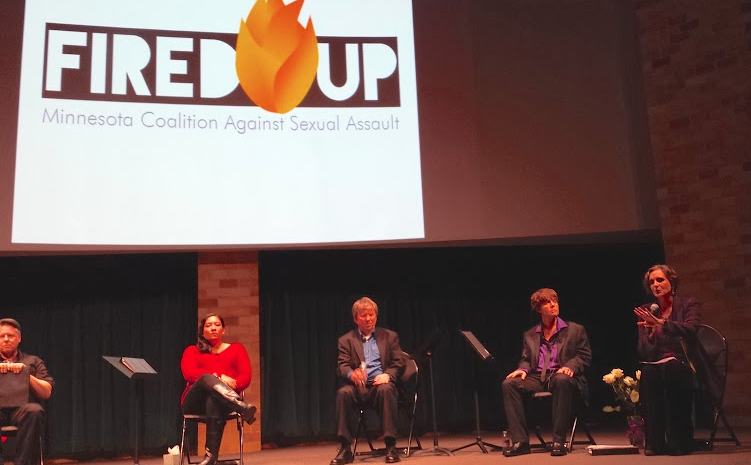About 175 Twin Cities community members and St. Thomas and Metropolitan State University students and faculty attended the first metro area performance of “Fired Up: Survivor Stories of Trauma, HOPE and Change” Tuesday in the O’Shaughnessy Educational Center auditorium.
The performance, co-presented by St. Thomas, Metropolitan State University and the Minnesota Coalition Against Sexual Assault, included five Minnesota survivors of child sexual abuse whose true stories aimed to spread awareness of child sexual abuse and sexual exploitation.

Playwright Cordelia Anderson began work on “Fired Up” by interviewing and doing oral histories with 23 survivors, who were then narrowed down to the five who made up the final cast.
“After years in this field of doing therapy and prevention and hearing lots of stories … it was still both very humbling, grounding and tapp(ed) into that outrage as I listened to so many people,” Anderson said. “We have got to put more resources into prevention, and we have got to mobilize better to let those who want to speak about this speak about it and have a clear spot for them in helping end this.”
Co-coordinator Roberta Gibbons, a professor at Metropolitan State University, said it’s important to shed light on the issue.
“For far too long child sexual abuse has been pretty much not for public discussion, and that creates a silence,” Gibbons said. “That’s the silence that perpetrators depend on to continue harming children.”
Sophomore Katie Baudler said the performance was an artistic and empathetic way to discuss such a sensitive topic.
“It was very inspirational for them to come forward — they were acting, but also sharing their own stories. I think it’s important to have things like that to trigger conversation on campus,” Baudler said.
The performance used music, song and script-read stories from the cast. A panel after the performance allowed audience members to ask questions and learn how they can help make a difference.
Sophomore Emma Kopp said many people often think of sexual assault as solely rape or penetration and that it’s important to remember that sexual assault is a broad spectrum of sexual abuse ranging from unwanted touching all the way to rape. She added that not all child sexual abuse is perpetuated by adults.
“As (Anderson) said, 30-40 percent of assailants are children, and I think that’s really concerning,” Kopp said.
Kopp, who is a FemCom co-leader, said that people survivors know, like relatives or family friends, are usually perpetrators of assault, which isn’t always expected.
“A lot of the time, it’s not a violent, fighting and screaming match between the abuser and the person they choose to attack,” Kopp said. “I think ‘attack’ puts this image of a violent struggle, whereas a lot of assault is coerced. They mentioned in the play that attackers ‘groom’ their victims. That’s something that makes assault that much easier and it is almost a type of ‘insurance’ that the victim or survivor won’t speak up.”
According to Anderson and cast members, one way people can help put an end to child sexual abuse is to call politicians and the state legislature and let them know that the issue matters and they want investment in prevention. The cast said making sexual abuse as easy to talk about as sports or Minnesota weather will also make a big difference.
“We don’t speak about this because we want people to feel sorry for us,” cast member Chris Stark said. “That doesn’t help us. We need to help everyone else know that they can make a difference.”
Jamie Bernard can be reached at bern2479@stthomas.edu.

